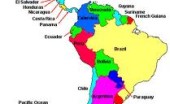Johannah Bernstein post: "eternally proud of my father’s extraordinary aeronautical engineering. legacy. here is a photo of the Canadair Water…
Gorbachev continues to shape history
Written by Diana Thebaud Nicholson // November 27, 2009 // Environment & Energy, Russia // Comments Off on Gorbachev continues to shape history
Gorbachev continues to shape history
By Kim Campbell,
(Ottawa Citizen Special)
In the past few weeks there have been many media reports celebrating the fall, 20 years ago, of the Berlin Wall — the physical manifestation of the divide and hostility between East and West. All these reports acknowledged the central role played by one man — Mikhail Gorbachev, the Soviet leader who introduced the word “glasnost” into the global lexicon and who, by his repudiation of force as a means to contain the peoples of eastern Europe, helped to end the Cold War and eliminate the spectre of mutual nuclear destruction that had hung over our hemisphere since the end of the Second World War.
I had the pleasure of meeting president Gorbachev in mid-1990 when he made a brief visit to Ottawa with his then foreign minister Eduard Shevardnadze.
As a cabinet minister I was included in the events where he spoke and as a former “sovietologist” I was struck by the change he represented. Little did we guess at that time that the break-up of the Soviet Union was imminent and would send Shevardnadze back to his native Georgia and president Gorbachev into political oblivion when the country he presided over ceased to exist.
It is all the more interesting and remarkable then that Gorbachev is today not merely a man of historical significance, but a man who continues to shape history with his world-changing ways.
When the Soviet Union dissolved in 1991, Gorbachev remained on the world stage — in fact, centre stage. Gorbachev was a central figure at the Rio Earth Summit in 1992 and shortly thereafter founded Green Cross International — a global network of environmental NGOs addressing issues at the nexus of environment and conflict.
Today Green Cross, under Gorbachev’s leadership, has grown to more than 30 national member organizations, active on every continent (counting Antarctic expeditions). In states of the former Soviet Union this means working with the Global Partnership (a G8 project launched at Kananaskis in which Canada is a significant player) to clean up old weapons sites and facilities. And in the Middle East it means working to resolve conflicts around shared water resources. In South America Green Cross works to minimize the environmental impact of mining projects, and in Ukraine and Belarus Green Cross works with children who are still affected by the Chernobyl disaster of 23 years ago.
The Gorbachev Foundation, the first real “think tank” in modern Russia, deals with Russian and global issues around peace and security, development, the environment and democracy in Eastern Europe. I came to know president Gorbachev again in the late 1990s when I was invited to be a fellow of an American-based foundation that also bears his name. Through this organization Gorbachev became a founding member of the Club of Madrid, whose members, former presidents and prime ministers, work to promote democratic values and leadership.
Gorbachev’s latest venture combines all of these elements, bringing together his work on the environment with the Green Cross, with climate-change projects of the Club of Madrid, the Club of Rome and his fellow Nobel Peace Prize laureates to form the Climate Change Task Force, engaging world leaders and experts in an effort to push for real progress on climate change at the Copenhagen conference next month, and to engage civil society in the challenge to deal with the effects of climate change.
This past month, Gorbachev has been doing what he does best: working the world leaders’ circuit selling climate change — the UN in Geneva in early October, the Club of Rome in Amsterdam two weeks later, Nobel laureates in Berlin and the Club of Madrid last week — and then on to Copenhagen next month.
At 78 years of age, that is quite a breathtaking agenda.
Like so many others who have been encouraged and motivated by his energy and warmth, I have been proud to work with Gorbachev over the years.
Twenty years after the fall of the Berlin Wall and the end of the Cold War, Mikhail Gorbachev continues to challenge the world to change — always for the better.
Kim Campbell is former prime minister of Canada. She is on the National Council of Green Cross Canada.
19 November
Gorbachev Is the Last 20th-Century Wilsonian
By Fyodor Lukyanov
(The Moscow Times) What Russians considered and still consider as Gorbachev’s naivete or even worse, his treason, is in fact a very conscious political idealism — one in which he, surprisingly, still has not lost faith. Gorbachev was the last Wilsonian of the 20th century. Like former U.S. President Woodrow Wilson during World War I, Gorbachev believed in “new thinking” in the name of global harmony. Having conceived the League of Nations, Wilson could not convince his own countrymen to support the concept, and that organization entered history as a symbol of helplessness. But that idea outlived its author and was finally deemed successful when the United Nations was created in 1945. The UN served as a stabilizing force in global affairs until the end of the Cold War, and it will probably regain this role in the future.
The world of the 21st century has not lived up to the expectations of Gorbachev or of those who, after the collapse of the Soviet Union, proclaimed themselves the victors. Meanwhile, the new world order has not taken shape — at least not as it was envisioned by Gorbachev or by former U.S. Presidents George H.W. Bush and George W. Bush. Like Wilson before him, Gorbachev witnessed the failure of his attempts to overcome superpower egoism for the sake of the common good.
Gorbachev’s and Wilson’s idealism remain milestones on the path toward progress. But the regularity with which politics chews up and spits out the latest idealist and then continues on with business as usual leads me to doubt whether any progress has been achieved at all.
Fyodor Lukyanov is editor of Russia in Global Affairs.



